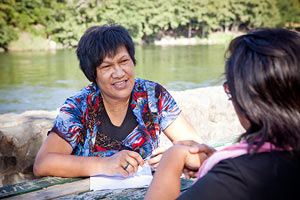Putting whānau first
 Terri Caulcutt
Terri Caulcutt
Master of Social Work
When Terri Caulcutt was in high school she was told the only job she should aspire to was typing. Now, as a mother of three, she is embarking on a Master of Social Work, having recently completed a Postgraduate Diploma in Social and Community Work at the University of Otago. That's a long way from the typing pool, and her success is largely because of whānau support, a grounding in raranga (weaving) and the ability to study without having to leave home.
Terri is of Ngāti Maniapoto descent, and was brought up by her grandmother on a small farm near Piopio, in Te Rohe Potae. She completed a Bachelor of Social Sciences in 1998 and began her career with the Prison Service.
In 2004, she sought a new challenge and began working with children and families at Child, Youth and Family in Hamilton. Here she recruits, assesses, supports and advocates for caregivers, reviews caregivers regularly and supports frontline social workers when whānau members want to become caregivers for their mokopuna.
Keen to gain full registration as a social worker, Terri enrolled in the Postgraduate Diploma programme offered via distance learning by the University of Otago's Department of Social Work and Community Development.
“This programme allows social workers to undertake further studies with a distinctly social work emphasis and thus enables full registration with the Social Work Registration Board in a much shorter time frame,” she says.
Terri received strong support from the Dunedin-based departmental staff, found the flexibility of distance learning helpful, and enjoyed participating in online discussions with colleagues. But studying while working full-time also presented challenges.
“Meeting work commitments and studying at postgraduate level requires discipline and commitment. At critical times whānau support is absolutely necessary, especially to pick up the slack when assignments are due… and for the odd meal!”
Throughout her studies Terri has maintained close contact with whānau and iwi, including taking guidance from her aunt Rangipare Raharuhi, in Ngati Pikiao. This has provided her with a foundation which she describes as “pivotal” to her personal and professional growth.
“She nurtured my skills in raranga and this has given me a greater appreciation of how and why our tupuna operated with such astuteness throughout time,” explains Terri, who says the appreciation of the exceptional skills her tupuna demonstrated have bestowed on her the gifts of humility and respect.
Such qualities, together with the practical skills and knowledge Terri has gained from her studies so far, have given Terri the confidence to continue learning via distance which will, in turn, help her to help other whānau.